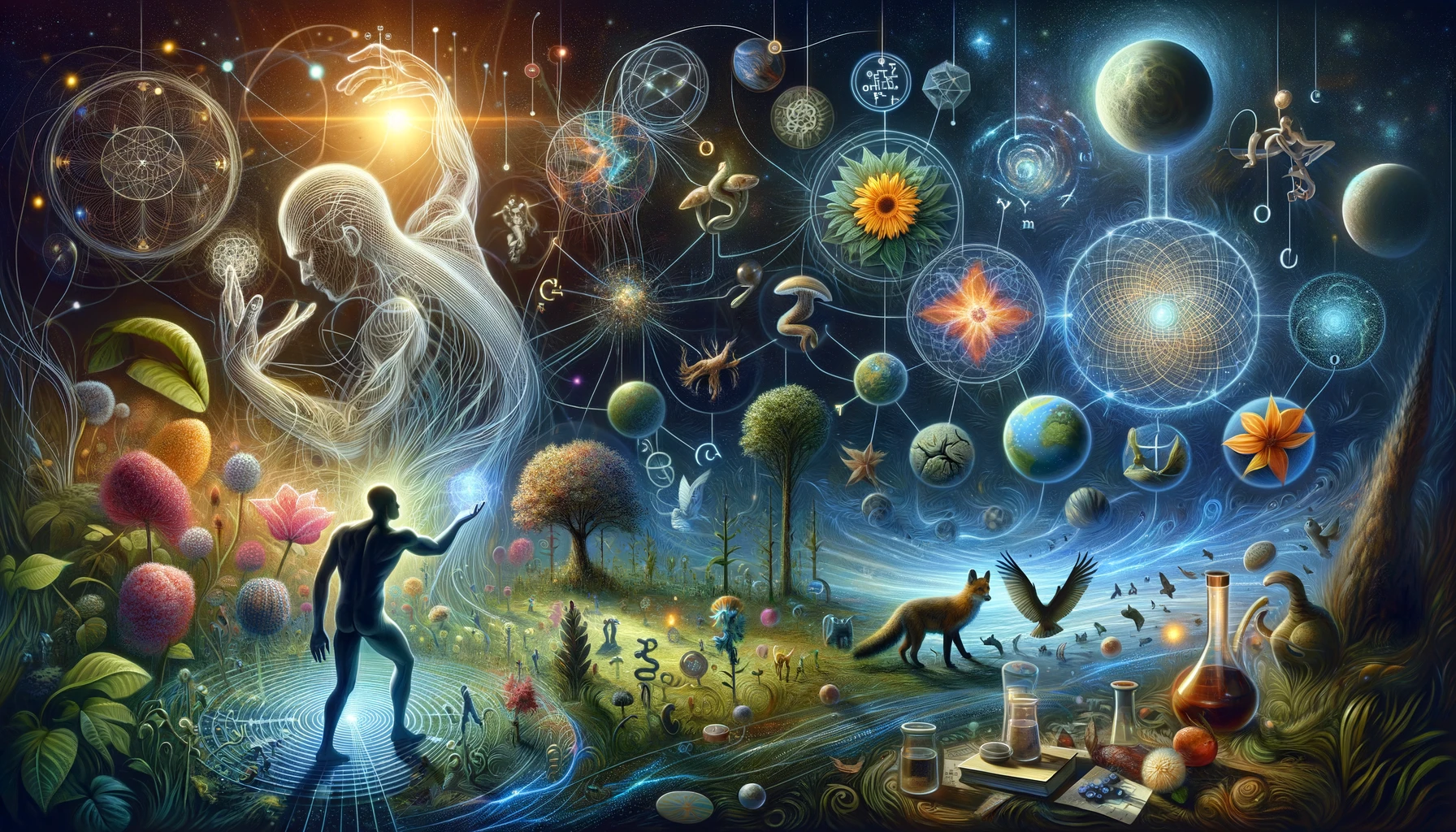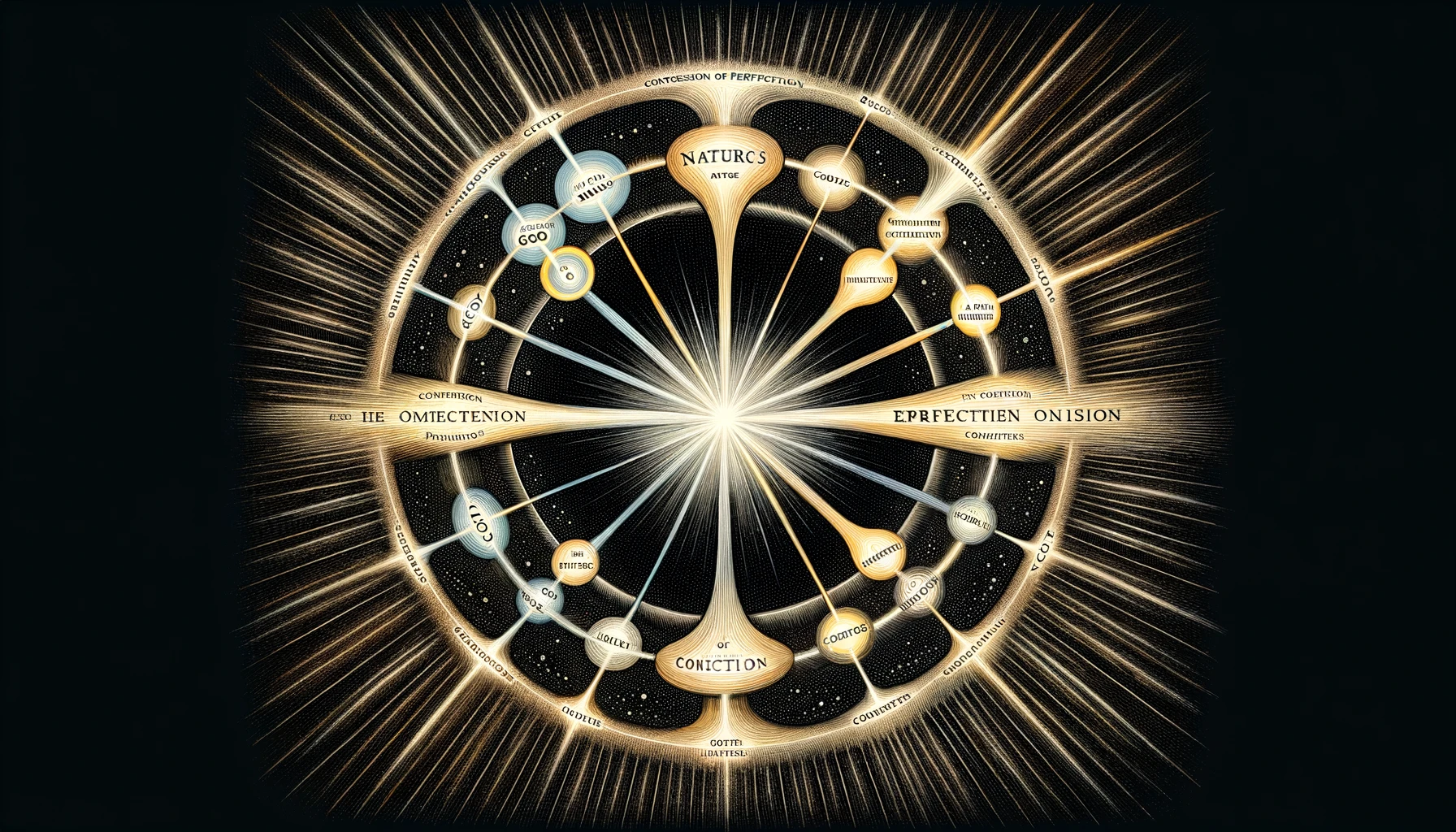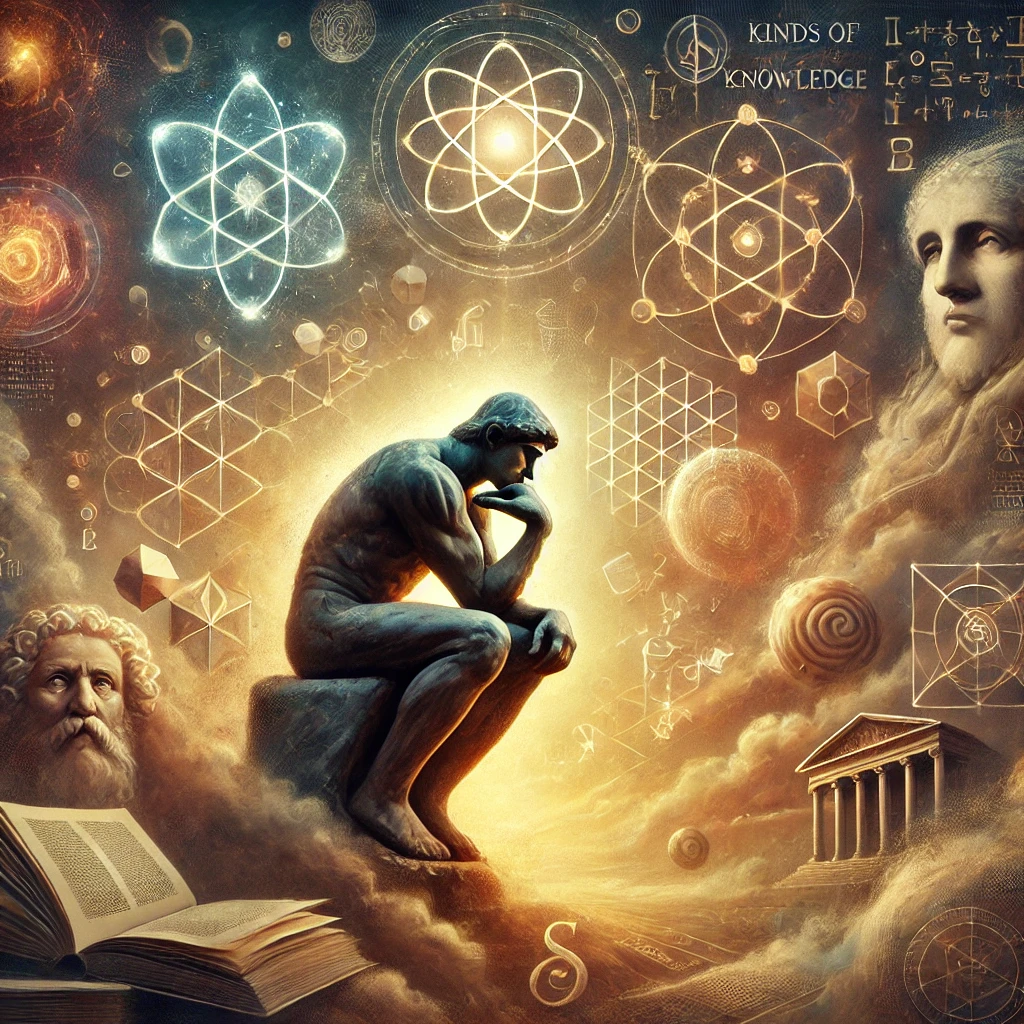
Why we look for meaning in everything?
1APENFIX All such opinions spring from the notion commonly entertained, that all things in nature act as men themselves act, namely, with an end in view.
- Everything in nature acts with an end in view, this is a common notion that all things in nature has
- All our actions has a end result or should say goal in view
It is accepted as certain, that God himself directs all things to a definite goal (for it is said that God made all things for man, and man that he might worship him). I will, therefore, consider this opinion, asking first, why it obtains general credence, and why all men are naturally so prone to adopt it? secondly, I will point out its falsity; and, lastly, I will show how it has given rise to prejudices about good and bad, right and wrong, praise and blame, order and confusion, beauty and ugliness, and the like.
- It is accepted as certain that God( Anthropomorphism of God ) directs all things to a definite goal, and that God made all things (there is a goal and meaning for everything).
- This has lead to prejudices about good and bad.
It will be sufficient here, if I assume as a starting point, what ought to be universally admitted, namely, that all men are born ignorant of the causes of things, that all have the desire to seek for what is useful to them, and that they are conscious of such desire.
- Born ignorant of the causes of things (we learn as we grow with experience)
- All have the desire to seek for what is useful to them (we seek what is useful to us)
Herefrom it follows, first, that men think themselves free inasmuch as they are conscious of their volitions and desires, and never even dream, in their ignorance, of the causes which have disposed them so to wish and desire.
- Men make desire, men believes it's him who makes the desire, but ignorance of the true cause of the desire.
- Example: Desire for sexual intercourse, we think it's us who desire it, but it's the nature that makes us desire it, we might be ignorance to the cause and underlying of desire, and behave with desire as a will of ourselves, meanwhile having the idea of a desire has been determined for us and it's ncessesery.
- Knowing desire and will as one and the same thing will bering this illusion of free-will, free-will illusion is contrary to self awareness.
Secondly, that men do all things for an end, namely, for that which is useful to them, and which they seek. Thus it comes to pass that they only look for a knowledge of the final causes of events, and when these are learned, they are content, as having no cause for further doubt. If they cannot learn such causes from external sources, they are compelled to turn to considering themselves, and reflecting what end would have induced them personally to bring about the given event, and thus they necessarily judge other natures by their own.
- Men makes good and bad of everything
- Men reflect his own good and bad on events, for example, death is bad for him and loved one, good for enemy, no difference for the one who we don't know, but there is no good or bad in death, it's just a natural event. For nature, no good or bad exist, but things happen because all the causes for that particular event happened, and we know it's impossible if all the causes for an event happen, and the effect would't follow, so everything with no exception happens because of necessity under laws of nature.
Further, as they find in themselves and outside themselves many means which assist them not a little in the search for what is useful, for instance, eyes for seeing, teeth for chewing, herbs and animals for yielding food, the sun for giving light, the sea for breeding fish, &c., they come to look on the whole of nature as a means for obtaining such conveniences.
- From the fact that we make good and bad for everything, we find many goods and useful assists for us, for instance, eyes for seeing, teeth for chewing, herbs and animals for yielding food, the sun for giving light, the sea for breeding fish, &c.,
Now as they are aware, that they found these conveniences and did not make them, they think they have cause for believing, that some other being has made them for their use. As they look upon things as means, they cannot believe them to be self—created; but, judging from the means which they are accustomed to prepare for themselves, they are bound to believe in some ruler or rulers of the universe endowed with human freedom, who have arranged and adapted everything for human use.
- Men find meaning in everything, when born with eyes, teeth, herbs, animals, sun, sea, etc. Since they have not made these things, they think there is a being who made them for their use and can't believe it's self-created.
- From this making meaning for everything and ignorance of self-creation, they believe in some ruler who made everything for human use and adapted everything for human use to do something specific.
- This perception lead us to think that everything made for us to achieve the end in view.
The true causes of things - Ignorance
We must not omit to notice that the followers of this doctrine, anxious to display their talent in assigning final causes, have imported a new method of argument in proof of their theory—namely, a reduction, not to the impossible, but to ignorance; thus showing that they have no other method of exhibiting their doctrine.
followers of this doctrine = ignorance people to the causes who look to make meaning of final causes.
For example, if a stone falls from a roof on to someone's head, and kills him, they will demonstrate by their new method, that the stone fell in order to kill the man; for, if it had not by God's will fallen with that object, how could so many circumstances (and there are often many concurrent circumstances) have all happened together by chance? Perhaps you will answer that the event is due to the facts that the wind was blowing, and the man was walking that way. "But why," they will insist, "was the wind blowing, and why was the man at that very time walking that way?" If you again answer, that the wind had then sprung up because the sea had begun to be agitated the day before, the weather being previously calm, and that the man had been invited by a friend, they will again insist: "But why was the sea agitated, and why was the man invited at that time?" So they will pursue their questions from cause to cause, till at last you take refuge in the will of God—in other words, the sanctuary of ignorance.
- A stone falls off a roof and kill someone
- People think that stone moved because of a reason and there was a meaning in it
- People would not believe it happen by chance
- If you explain that it was wind blowing, they ask why wind was blowing
- They continue looking for meaning in the causes of that effect till you accept the existence of
- Ignorance of causes
So, again, when they survey the frame of the human body, they are amazed; and being ignorant of the causes of so great a work of art, conclude that it has been fashioned, not mechanically, but by divine and supernatural skill, and has been so put together that one part shall not hurt another.
- Because of ignorance they would think that there body, as a great work of art, has been made for them by supernatural causes. (of course these days we know Darwin's theory)
Quick Summary
Everything in Nature act with a end in view and goal, including us.
- This evolutionary based act lead make meaning of good and bad for finite actions.
- Reflection of this good and bad on events and giving meaning to everything.
- From this reflection and meaning of good and bad, it follows finding of lots of natural goods.
- From this we find that everything made for us to use by a creator with end in view, an end as the same as there own finite action which is conditioned to meaning of good.
We must be aware of true causes of a event and understand, instead of making meaning, good and bad for the sake of an end.
Ethics 4PREF : Chapter 4 PREFACE
The reason or cause why God or Nature exists, and the reason why he acts, are one and the same. Therefore, as he does not exist for the sake of an end, so neither does he act for the sake of an end; of his existence and of his action there is neither origin nor end.
God is self-caused, and he doesn't act for the sake of an end for existence, and it's actions doesn't have a origin or end.
Wherefore, a cause which is called final is nothing else but human desire, in so far as it is considered as the origin or cause of anything. For example, when we say that to be inhabited is the final cause of this or that house, we mean nothing more than that a man, conceiving the conveniences of household life, had a desire to build a house.
Our desire has begin, will and desire for the sake of an end, now from this page of talking, it's more visible that what we expect from nature is something which is conditioned to our desire. It follows that we assume creator as in the shape of humans with human attributes and desire, which perfectly fits into the picture.
Wherefore, the being inhabited, in so far as it is regarded as a final cause, is nothing else but this particular desire, which is really the efficient cause; it is regarded as the primary cause, because men are generally ignorant of the causes of their desires. They are, as I have often said already, conscious of their own actions and appetites, but ignorant of the causes whereby they are determined to any particular desire.
Therefore, the common saying that Nature sometimes falls short, or blunders, and produces things which are imperfect, I set down among the glosses treated of in the Appendix to Part I. Perfection and imperfection, then, are in reality merely modes of thinking, or notions which we form from a comparison among one another of individuals of the same species; hence I said above (II. Def. vi.), that by reality and perfection I mean the same thing.
For we are wont to refer all the individual things in nature to one genus, which is called the highest genus, namely, to the category of Being, whereto absolutely all individuals in nature belong. Thus, in so far as we refer the individuals in nature to this category, and comparing them one with another, find that some possess more of being or reality than others, we, to this extent, say that some are more perfect than others. Again, in so far as we attribute to them anything implying negation—as term, end, infirmity, etc., we, to this extent, call them imperfect, because they do not affect our mind so much as the things which we call perfect, not because they have any intrinsic deficiency, or because Nature has blundered. For nothing lies within the scope of a thing's nature, save that which follows from the necessity of the nature of its efficient cause, and whatsoever follows from the necessity of the nature of its efficient cause necessarily comes to pass.
When we compare individuals from the same nature, we see some of them being more perfect than others, in here we say that nature has fallen short for it's quality, and we call it all imperfect. Because they don't affect our mind more than what we call perfect (perfect as the meaning of what we would like to define and not finding it in nature).
He also explains more in details about perfection, which I shall write about it in it's own page.
Definition of good and bad
As for the terms good and bad, they indicate no positive quality in things regarded in themselves, but are merely modes of thinking, or notions which we form from the comparison of things one with another. Thus one and the same thing can be at the same time good, bad, and indifferent. For instance, music is good for him that is melancholy, bad for him that mourns; for him that is deaf, it is neither good nor bad.
Things happens because of necessity, good and bad, are our thinking mode to model the meaning for ourselves. By modeling final cause to good or bad, without the knowledge of prior causes, we are forming ideas which is called opinion. Opinions which vary in nature from one man to another, thats why we find many different religions that tried to go the same path by different ways, even the path of believing in things which doesn't exist has been deterministic, with no will and neccecery by all its prior causes.
Ethics 4D7 : By an end, for the sake of which we do something, I mean a desire.
Existential Panic
So we saw that there is no actual meaning in the universe for the sake of an end, it's our minds misinterpretation of reality.
But for existential crisis, we must know and be aware of our thinking path and the way that this error generates, it can be controlled if its understood.
People happen to trap in this error as far as they project there own human value onto Nature. We should't judge nature by human standards, because we know that nature hasn't made for us and we are not the special loved ones of a creator who made us for the sake of a master plan to save everything.
Recognition of this error and its process gives you awareness and understanding of it. If you deeply and rationally think of how the error generates, and also see the common pattern which rapidly repeat through history and time for all generations by necessity, you will be able to understand it and overcome your fear and desire for the sake of an end.
The solution
The solution lies in understanding the process of error and being aware of the value reflection.
Existential meaning error generation pattern:
- We born ignorant with no default knowledge of causes and things.
- Everything in nature act for the sake of an end in view.
- We do everything for the sake of an end, this will lead for us to look whats useful for us by understanding the final cause.
- If we don't find the source and meaning of phenomena, we consider ourselves to be the primary objective of phenomena and consider self as the ultimate target by labeling it as good and bad.
- For example, we find many means which assist us to search whats useful for us, like animals, plants, teeth and etc..
- Now that we found all these things and we know that we haven't made them, so we start to think that there has to be a cause for believing that some other being has made them for us use and can't believe that all is self-caused.
- So we judge based on the meaning of things that there must be a ruler who arranged everything for them to use.
So what do we do? Don't panic
The very first step is not to panic.
The question arise is that if life has no meaning, then why we are here and what should we do?
We do what everyone before us did, making our own meaning, don't wait for the world to give you a meaning for existence. In order for something for us to make meaning out of, it has to act for the sake of an end in view, but the world doesn't act for the sake of an end, nether seams if there is any kind of will behind it.
How do we find it?
- Seek knowledge and understanding
- Meaning doesn't just come to you, so don't wait for it, don't wait for something to inspire you like an spark.
- We expect the meaning to just be there for us(which now we know it's not there)
so there is no choice but to make your own meaning.
- Ethical living and virtue
- Ethical living and virtue are considered the best goals that a person can achieve thought there life path, nothing can be compared to the sense of inner peace purpose which follows from.
- Follow the rest of Ethics for this.
The highest good of an individual is to seek best for his community
Lastly and most importantly, seek the highest good by finding the best for your community. This community at the very first level has 1 member which is self, and at each level it expand out.
- Self
- Family
- Neighborhood
- City
- Country
- World
Enjoy the ride
Now that we know world doesn't work for the sake of an end, it makes more sense for us not to take the final cause so seriously.


